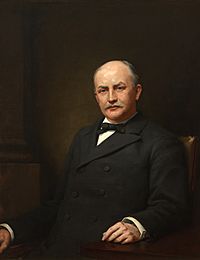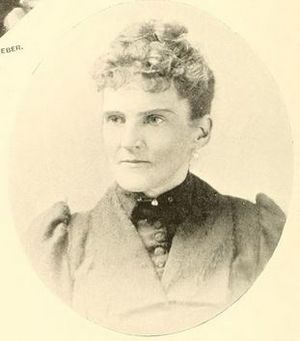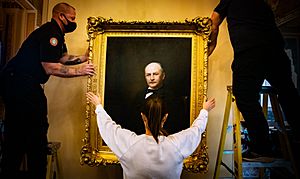Charles Frederick Crisp facts for kids
Quick facts for kids
Charles Frederick Crisp
|
|
|---|---|
 |
|
| 33rd Speaker of the United States House of Representatives | |
| In office December 8, 1891 – March 4, 1895 |
|
| Preceded by | Thomas B. Reed |
| Succeeded by | Thomas B. Reed |
| Leader of the House Democratic Caucus | |
| In office December 8, 1891 – March 4, 1895 |
|
| Preceded by | John G. Carlisle |
| Succeeded by | James D. Richardson |
| Member of the U.S. House of Representatives from Georgia's 3rd district |
|
| In office March 4, 1883 – October 23, 1896 |
|
| Preceded by | Philip Cook |
| Succeeded by | Charles R. Crisp |
| Personal details | |
| Born | January 29, 1845 Sheffield, England |
| Died | October 23, 1896 (aged 51) Atlanta, Georgia |
| Political party | Democratic |
| Profession | Law |
Charles Frederick Crisp (born January 29, 1845 – died October 23, 1896) was an important American political figure. He was born in England but moved to the United States with his family when he was a baby. Crisp became a lawyer and later served in the U.S. House of Representatives for Georgia from 1883 until he passed away in 1896. He was a leader of the Democratic Party in the House, even serving as the Speaker of the House, which is a very powerful position. His son, Charles R. Crisp, also became a member of Congress.
A Young Life in Georgia
Charles Frederick Crisp was born in Sheffield, England, on January 29, 1845. Later that year, his parents moved to the United States and settled in Georgia. Charles went to school in Savannah and Macon, Georgia.
When the American Civil War began, he was visiting his parents in Luray, Virginia. His parents were actors on a Shakespearean play tour. Charles joined a local army unit called the "Page Volunteers" and became a lieutenant. He served until May 12, 1864, when he was captured at the Battle of Spotsylvania Court House. He was held as a prisoner of war at Fort Pulaski, Georgia, and later at Fort Delaware. After being released in June 1865, he joined his parents in Ellaville, Georgia.
Becoming a Lawyer and Judge
After the war, Crisp studied law in Americus, Georgia. He became a lawyer in 1866 and started his own practice in Ellaville. In 1872, he was appointed as a solicitor general, which is a type of prosecutor. He was reappointed in 1873.
In June 1877, he became a judge of the superior court in the same area. He was elected to this position again in 1878 and reelected in 1880. In September 1882, he left his job as a judge to run for the United States Congress.
Crisp married Clara Bell Burton, who was from Ellaville. Her family was wealthy. At first, Clara Bell's parents were not happy about the marriage because Crisp was a poor lawyer from an acting family. But Clara Bell and Charles loved each other very much. They got married in a small ceremony with a few friends. Soon after, Clara Bell's parents became very fond of Charles. He became a great support to them in their old age. Clara Bell later said that Charles was the "dearest, sweetest husband" to her.
Serving in Congress
In April 1883, Crisp led the Democratic convention in Atlanta, Georgia. He was elected as a Democrat to the U.S. House of Representatives in 1882. He served from March 4, 1883, until his death in 1896.
In Congress, he held important roles:
- He was chairman of the Committee on Elections in the Fiftieth Congress.
- He was chairman of the Committee on Rules in the Fifty-second and Fifty-third Congresses.
- He served as the Speaker of the House of Representatives in the Fifty-second and Fifty-third Congresses. This means he was the leader of the House.
In 1896, he was nominated to become a United States Senator for Georgia. However, he died in Atlanta on October 23, 1896, before he could serve. He was buried in Oak Grove Cemetery in Americus. Crisp County in Georgia is named in his honor.
Legacy
Because Charles Frederick Crisp was a former Speaker of the House, his portrait was displayed in the U.S. Capitol building. In June 2020, the Speaker of the House, Nancy Pelosi, ordered that his portrait be removed from public display. This decision was made because Crisp had fought in the Confederate States Army during the Civil War.
See also
- List of United States Congress members who died in office (1790–1899)
 | Bayard Rustin |
 | Jeannette Carter |
 | Jeremiah A. Brown |



